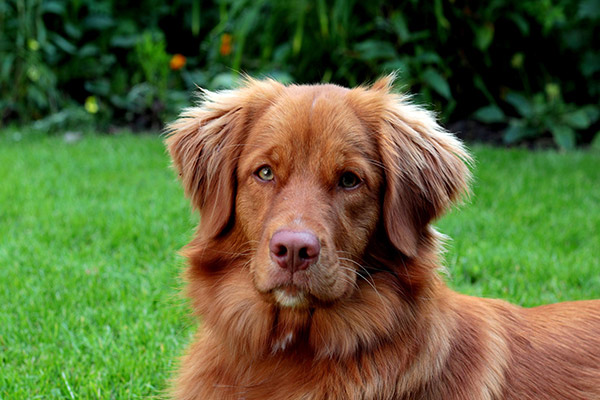The Nova Scotia Duck Tolling Retriever, as the name implies, is a rare breed from Nova Scotia. It is the smallest retriever in the American Kennel Club, standing at the height of 21 inches. Their small bodies are covered with a stunning crimson coat.
These dogs are known as redheads with boundless energies. They are upbeat athletes as well who love lots of outdoor activities. If you’re looking for a dog to cuddle, the Nova Scotia Duck Tolling Retriever may not be for you. These dogs require someone who can give them lots of attention.
Nova Scotia Duck Tolling Retrievers are fun-loving dogs who enjoy spending a lot of time with their family. If you own one, you would surely need lots of energy to keep up with these dogs.

Nova Scotia Duck Tolling Retriever Breed Statistics
| Dog Breed Group | Sporting |
| Breed Size | Medium |
| Height | 18-21 inches (male); 17-20 inches (female) |
| Weight | 35-50 pounds |
| Lifespan | 12-14 years |
Nova Scotia Duck Tolling Retriever Breed Ratings
| Energy level | |
| Exercise needs | |
| Requires attention | |
| Playfulness | |
| Trainability | |
| Shedding | |
| Grooming | |
| Friendly with family | |
| Friendly with kids | |
| Friendly with strangers | |
| Friendly with other dogs | |
| Prey Drive |
Nova Scotia Duck Tolling Retriever History
Nova Scotia Duck Tolling Retrievers or Tollers, for short, originated from Nova Scotia in the 19th century. They are known as the “Decoy Dog” and were developed by sportsmen for hunting. Tollers were developed to imitate foxes – curiosity, color, and movements in catching waterfowl.
The original Tollers were foxes. So, it’s only right for these sportsmen to develop dogs that have almost the same qualities as foxes. The purpose of these dogs is to go into the water and bring back downed birds.
Hunters from Labrador and the Chesapeake Bay may have created these same dogs as well. However, what makes the Nova Scotia Tollers different is that they can attract dogs and retrieve them.
It is believed that Tollers were developed from the crossbreeding of several retriever breeds such as Cocker Spaniels, Irish Setters, and Collies. The original name given to them was Little River Duck Dogs but was later changed in 1945 when the breed was finally recognized.
By the 1960s, the dog was imported to the US. However, it wasn’t until 1984 when the breed became known as the Nova Scotia Duck Tolling Retriever Club was founded.
The American Kennel Club recognized the breed in 2001. Now, they are among the top 100 most popular dog breeds in the US.
They are now developed into impressive working dogs that will dive into anything aside to him in a day. Their boundless energies are the perfect fit for people who are also energetic and athletic.
Nova Scotia Duck Tolling Retriever Temperament
Nova Scotia Duck Tolling Retrievers may look very similar to Golden Retrievers, but their temperaments may differ significantly. They are generally affectionate, intelligent, and outgoing dogs. Some people describe their personality as a mix of a Golden Retriever and a Terrier.
Since they have very high energy, the Tollers do lots of exercise which may include fetching and swimming. Mental exercises should also be given. These dogs are not the kind of pets you get for the sake of getting one. They require work.
Smart, independent, and curious, these dogs may not be as submissive as Golden Retrievers. They are easily distracted, and training them will require lots of patience.
As family dogs, they are humorous and will make you laugh. But if you’re looking for pets to cuddle, these are not the dogs to get. They are known to be gentle with children but will require supervision when playing with toddlers.
Although some Tollers are friendly with strangers, most are aloof and reserved. They tend to be suspicious that they won’t immediately come forward. Don’t worry, though, because they are not aggressive.
The Nova Scotia Duck Tolling Retriever is also usually okay with other pets, even with cats. Though he may have tendencies to chase them, it’s usually for play.
Early socialization is essential to make these dogs more well-rounded. This will also help him become more accustomed to new people, animals, sights, or sounds. It may also keep any bad temperament at bay to make them more house-friendly dogs.

Duck Toller Care Requirements
- Nutrition: Like any other highly energetic breeds, the Tollers require a high-quality diet to support his everyday needs. This means that his food should contain all essential nutrients like proteins, fats, carbohydrates, fiber, and vitamins. If you’re purchasing ingredients for their meal, you should only buy the high-quality ones. You can get proteins from animal meat like beef, chicken, or fish. You can get fats from fish and chicken oils and carbohydrates from whole grains. Add some fruits and vegetables too for better digestion. For dog food, choose the premium ones. It should also contain animal-based protein instead of plant-based. Read the label and make sure that there are no fillers and other harmful additives that may cause health problems.
- Grooming: The Nova Scotia Duck Tolling Retriever’s coat needs weekly brushing to keep it healthy. It sheds seasonally, and daily brushing is highly recommended to remove any loose hair during this season. When brushing the coat, pay close attention to the areas under the ear to remove any tangles. You might also need to trim extra hair to keep them looking neat. The areas around the ear and feet should be cut. Baths can be given occasionally, depending on how dirty they are. But ears should be regularly cleaned to prevent an ear infection. Nails should be trimmed regularly as well and must be kept short as much as possible.
- Exercise: These very energetic dogs need lots of activities. If you want Tollers to be good dogs, you need to tire them out. For some Nova Scotia Duck Tolling Retrievers, brisk walking for 30 minutes should suffice. However, most might require more activities like ball chasing, running, biking, hiking, or swimming. They enjoy their activities more when they do it with their humans. You can also let them join in canine sports where they can showcase their skills more.
- Health: The Toller is a generally healthy dog. There are not many health conditions that affect them, but knowing the very few would help prevent your dogs from getting sick. Some diseases for you to watch out are hip dysplasia, progressive retinal atrophy, collie eye anomaly, and deafness. Few of these diseases are genetically inherited, so it’s a good idea to meet at least one of your dog’s parents and see what conditions may be present. Screening tests are also available for some diseases, and it’s advisable to have your dog take one.
- Lifespan: The life expectancy of Nova Scotia Duck Tolling Retrievers is 12-14 years.
Fun Facts about Duck Tolling Retrievers
- Nova Scotia Duck Tolling Retrievers originated from Europe.
- They are also sometimes called “Red Decoy Dogs.”
- They were originally called “Little River Duck Dog” before their name was changed to “Nova Scotia Duck Tolling Retriever.”
- They are known to have the longest name among the American Kennel Club dogs.
- The “tolling” part of the dog’s name meant “to pull”; they were developed to toll, lure, and retrieve waterfowl.
- These dogs are the smallest of the retriever breeds.
- They are great at swimming; they have webbed feet and a double coat.
Check Out Other Sporting Dog Breeds:
American Water Spaniel, Boykin Spaniel, Brittany, Chesapeake Bay Retriever, Clumber Spaniel, Cocker Spaniel, Curly-Coated Retriever, English Cocker Spaniel, English Setter, English Springer Spaniel, Field Spaniel, Flat-Coated Retriever, German Shorthaired Pointer, German Wirehaired Pointer, Golden Retriever, Gordon Setter, Irish Red and White Setter, Irish Setter, Irish Water Spaniel, Kooikerhondje, Labrador Retriever, Lagotti Romagnoli, Pointer, Spinoni Italiani, Sussex Spaniel, Vizsla, Weimaraner, Welsh Springer Spaniel, Wirehaired Pointing Griffon, Wirehaired Vizslas

